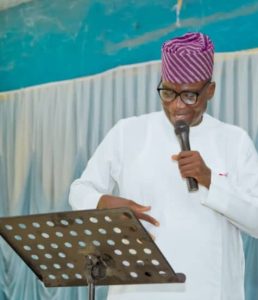NIGERIA’S DEMOCRACY AT CROSSROADS BY ASIWAJU ASEYORI AYOWOLE ADEMOYEGUN
Nigeria’s democratic journey has been marked by significant milestones, but the country’s political landscape is currently facing a critical juncture. The current trend of drifting towards a one party State and the complete erosion of ideological differences between political parties have raised concerns about the health of Nigeria’s democracy.
As the nation navigates these challenges, it is imperative to reflect on the implications of these trends and the potential consequences for the country’s democratic future.
This piece explores the dangers of a one-party dominance and the importance of ideological-based democracy in ensuring a robust and accountable democratic system.
The shift towards a one-party state in Nigeria poses significant risks to democracy, including reduced accountability, stifled dissent, and unchecked power. A viable opposition is crucial for promoting good governance, transparency, and citizen engagement. It is essential for Nigerians to prioritize democratic principles and ensure a level playing field for all parties to thrive.
The lack of ideological identities and clear policy differences between parties can indeed lead to opportunistic defections and undermine democratic stability. When parties are driven more by power and patronage than ideology, it can create an environment where politicians switch parties based on personal gain rather than principle. This can erode public trust and make it challenging for citizens to hold elected officials accountable.
The dominance of a single party can indeed lead to internal power struggles, factionalism, and potential implosion. With limited opportunities for upward mobility and power sharing, tensions within the party may escalate. This situation could create fertile ground for social unrest, protests, or even revolutionary movements.
The consequences of such instability would be far-reaching and potentially devastating for the country.
The concept of a shadow cabinet is a great way for opposition parties to hold the government accountable and provide alternative perspectives. It shows that the focus is on serving the people rather than just personal or party interests. Unfortunately, this practice seems to have faded away in many places, including Nigeria.
Reviving the concept of a shadow cabinet could indeed help improve governance and accountability in Nigeria. By having a structured opposition with clear alternative policies, citizens would have a better understanding of the choices available to them, and the ruling party would be held to a higher standard of accountability. This could lead to more informed decision-making and better representation of the people’s interests.
In conclusion, Nigeria stands at a critical crossroads, where the fate of its democracy hangs in the balance. To safeguard its democratic future, it is crucial to promote ideological-based politics, encourage robust opposition, and prioritize the interests of the governed. By embracing these principles, Nigerians can ensure a more accountable, transparent, and responsive government that truly serves the people.
ASIWAJU ASEYORI AYOWOLE ADEMOYEGUN writes from Akure for DYNAMICS OF GOOD GOVERNANCEGOVERNANCE GROUP*
